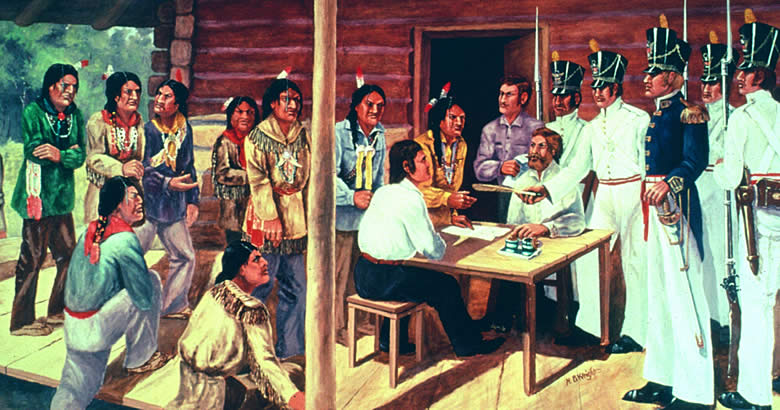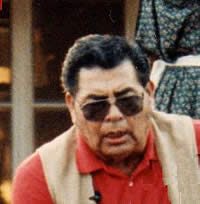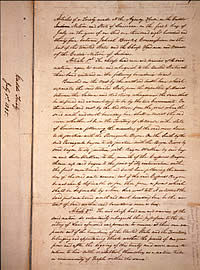
The 1835 Treaty of Cession between
the United States and the "Chiefs, Head Man, and
Warriors of the Caddo Nation of Indians." Oddly,
although interpreter Larkin Edwards signature is shown
on page 6 of the treaty, he was not present during negotiations
and did not translate for the Caddo. Document courtesy
of National Archives. (Click to enlarge and see additional
pages in PDF format. You will need Adobe
Acrobat to view this file.) |
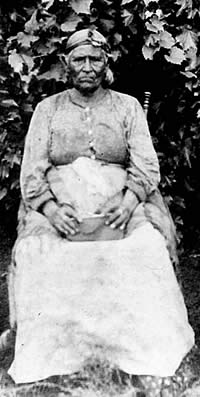
Caddo woman Mary Inkanish. She recalled
that when she was a child "the whites raided the
Indians, drove them from their villages and took a portion
of their crops…." Photo courtesy Western History
Collection, University of Oklahoma Library. (Click to
see full image.)
|
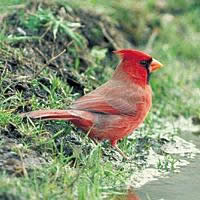
A Texas Cardinal, perhaps the inspiration
for a Caddo song. Photo courtesy Texas Parks and Wildlife.
|
|
Hungry, dispirited, and recognizing the
inevitable, the Caddos agreed to sell their Louisiana lands
to the United States in the 1835 Treaty of Cession, three
months after the Great Raft had been cleared. Tashar, who
succeeded Dehahuit as head chief, said in support of the treaty:
My Children: For what do you mourn? Are
you not starving in the midst of this land? And do you not
travel far from it in quest of food? The game we live on
is going farther off, and the white man is coming near to
us; and is not our condition getting worse daily? Then why
lament for the loss of that which yields us nothing but
misery? Let us be wise then, and get all we can for it,
and not wait till the white man steals it away, little by
little, and then gives us nothing.
The Caddos got something for their land, but
very little. They were handicapped by the absence of their
regular interpreter, Larkin Edwards, during the negotiations.
Further, their French Creole advisors were not allowed in
the council. On July 1, 1835, the Caddos signed the treaty,
which transferred about a million acres of land to the United
States in exchange for $30,000 in goods and horses and $10,000
per year in cash for the next five years. The Caddos apparently
believed Timber Hill was in Louisiana, though it was actually
then part of Mexico (now Texas), and people gradually began
to leave the village that year. By 1842, it seems to have
been completely abandoned.
Ninety years after the agreement was signed,
a very old Caddo woman named Mary Inkanish remembered that
when she was a small child "the whites raided the Indians,
drove them from their villages and took a portion of their
crops. After the treaty, part of the money was paid, but a
part never was paid."
Some Kadohadachos moved into Oklahoma, some
to Mexico, and some to the Brazos River farther west in Texas,
where a short-lived reservation was established for them in
1854. Hostile Texas neighbors finally forced the removal of
the last Caddos to a reservation on the Washita River in Oklahoma
that had already been established for the Wichitas.
Many years later, anthropologist Dayna Bowker
Lee recorded Lowell "Wimpy" Edmonds, a member of
the Caddo Nation of Oklahoma, singing some "riding songs."
Mr. Edmonds is a descendent of a Caddo woman and Larkin Edwards,
the Caddos' white interpreter during the time of Timber Hill.
He said the riding songs were sung while traveling on horseback,
and he thought two of them related to his people's removal
to Oklahoma, when they rode at night to avoid antagonistic
Texas soldiers. In this song, a redbird warns them that daylight
approaches:
Redbird [Yawdawsh] (Listen
to a clip of Edmonds performing Redbird)
Redbird, redbird
He got scared, he flew up out of the bush.
It must be getting close to daylight.
Another song is about a near encounter with
a Comanche (Listen
to a clip of the Comanche song):
The Comanche was waving his hand.
Go ahead, friend, go tell about this.
He thought he would, he wanted to,
He didn't see me, the Kadohadacho.
|
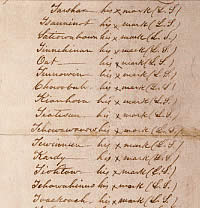
Inset of signature page of the Treaty
of Cession, with names of Tashar and other Caddo leaders.
Click images to enlarge
|
|
The Caddos got something for their land, but very little.
They were handicapped by the absence of their regular
interpreter during the negotiations.
|
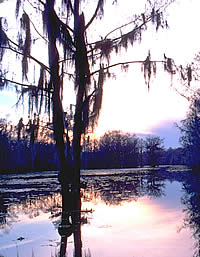
Dusk at Caddo Lake, downstream from
the site of Timber Hill. Photo courtesy Texas Parks
and Wildlife.
|
|
The late Lowell "Wimpy" Edmonds, Caddo drummer and singer. Photo courtesy Dayna Bowker Lee. |
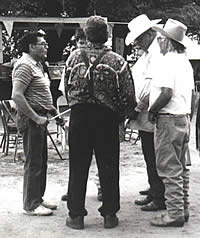
Caddo singer Lowell "Wimpy"
Edmonds (left), performing with drumming group. Photo and audio recordings by Lowell "Wimpy"
Edmonds and Dayna Bowker Lee.
|
|
